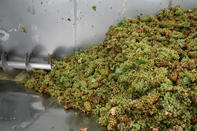Conscious Consumption
To quote Stephen Fry, “Wine can be a better teacher than ink, and banter is often better than books.” Following that train of thought, organic wine holds within its liquid charm a multitude of reasons to indulge. Where one glass is only bettered by two, organic wine is the definitive tipple for you.

Quotes and rhymes aside, conscious consumption has steadily been making its presence the norm in the world, and certainly in South Africa with its plethora of recycling initiatives and mindful use of natural resources, like water. It was only a matter of time before a standard addition to sophisticated dining, or any relaxing pastime for that matter, made its entry into environmentally friendly living.
So what is organic wine? Well, what’s organic for one country is not necessarily organic for another. This is due to many countries having different certification criteria, while there are quite a few wines that are in fact organic, but are not promoted as ‘organic’ as a result of not wanting to incur the cost of registering as an organic wine, and thus opt out for the certification.
Legalities aside, organic wine is a wine that has been verified and certified free of any pesticides and unnatural substances by an authorised certification body. Wine farms or vineyards, which produce organic wine, tend to include the entire farm in the organic process; establishing an ecology that is free of harmful chemicals and practices.
Benefits of Organic Wine

The benefits of red wine has been well publicised, so inferring that the benefits of organic wine would follow a similar template would be spot on.
Due to the lack of harmful pesticides and unnatural chemicals used in the cultivation process as well as maintaining an environment that follows ecologically consciousness practices, like introducing cover crops for favourable insects that help eradicate pests that are harmful to the development of grapes. While the addition of ducks and other farm animals further assists in the reduced presence of unfavourable insects, instead of utilising pesticides, which all happily combines to result in organic wine that contains reduced sulphites.
Why should wine consumers be thrilled about these specific chemical reductions, you may ask? Well for starters, sulphites are chemicals that impedes discolouration in food and beverages. These preservatives assist in making food look palatable for longer. However there is a catch. Sulphites can be experienced as an allergen, creating an allergic reaction in individuals susceptible to it. These reactions can manifest as blotchy skin, hives and cramps.
Wine connoisseurs looking to avoid an unfavourable reaction from their favourite pastime can reach for a bottle of nature’s organic goodness without having to incur the wrath of an allergen.